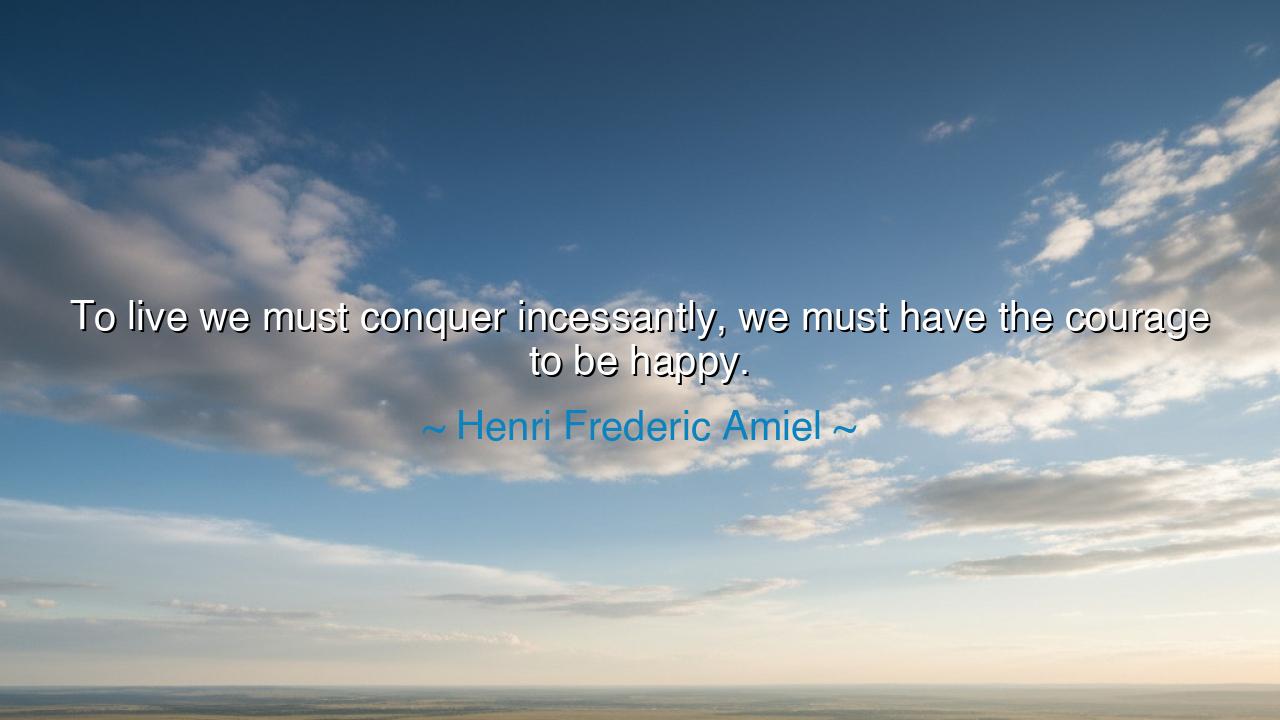
To live we must conquer incessantly, we must have the courage to






“To live we must conquer incessantly, we must have the courage to be happy.” Thus spoke Henri Frédéric Amiel, the Swiss philosopher and poet whose soul wrestled with the mysteries of existence and the restless tides of the human heart. In this profound saying, he unveils a truth that echoes through the ages: that life is not a passive experience, but a continual conquest—a battle not fought with swords and shields, but with will, faith, and perseverance. To truly live, one must fight not merely against the world, but against the darker forces within—doubt, despair, and fear. And yet, Amiel adds a deeper challenge: we must have the courage to be happy. For happiness itself is not a gift bestowed by fate; it is a victory won through courage and conscious choice.
Amiel wrote these words during the 19th century, a time of personal melancholy and philosophical reflection. Though he lived a quiet life in Geneva, his inner world was one of great struggle. His journals reveal a man who pondered endlessly upon duty, virtue, and the fleeting nature of joy. It was from this crucible of introspection that he realized a universal truth—that happiness demands courage, for it requires us to rise each day and conquer despair anew. To live nobly is not merely to survive, but to keep one’s heart alive amid the tempests of the soul. Thus, his words are not the idle musings of a dreamer, but the hard-won wisdom of one who has fought the silent battles of the human spirit.
The phrase “to live we must conquer incessantly” reminds us that existence itself is a ceaseless struggle toward light. Each day brings its trials: uncertainty, disappointment, loss, and temptation. Yet to live—to truly live—is to face them not with resignation but with defiance. The Stoics of old, like Marcus Aurelius, spoke of this same truth. “The art of living,” he wrote, “is more like wrestling than dancing.” Every moment demands effort, resilience, and mastery over the self. To live well is not to escape struggle, but to engage with it—boldly, consciously, and without surrender.
But Amiel’s second declaration is perhaps the more radical: “we must have the courage to be happy.” For what greater act of bravery is there than to open one’s heart to joy in a world filled with suffering? Many find comfort in melancholy, believing that happiness is fragile, fleeting, or undeserved. Yet Amiel challenges us to reject that timidity. Happiness is not weakness—it is strength. To be happy despite adversity is the most heroic form of defiance. It is to say to the world: “You may wound me, but you will not steal my light.” Such courage is not naïve optimism, but spiritual valor, the same courage that carried the saints through persecution and the dreamers through despair.
Consider the life of Helen Keller, who was both blind and deaf from early childhood. For most, such a fate would have been a prison of silence and sorrow. Yet Helen, guided by patience, faith, and determination, chose to conquer incessantly—to learn language, to write, to speak, and to inspire millions. In her writings, she spoke often of happiness, not as something given, but something chosen. She once wrote, “Keep your face to the sunshine and you cannot see the shadow.” Her life was a living embodiment of Amiel’s creed—proof that joy is not found in the absence of hardship, but in the triumph of the soul over it.
To have the courage to be happy means to forgive, to hope, and to love even when the world disappoints us. It means choosing gratitude over bitterness, light over darkness, creation over complaint. Every human being carries both despair and delight within them, but the courageous heart tends always toward the latter. Those who find joy not because life is easy, but because they have trained their spirits to see beauty amid sorrow—these are the true conquerors of existence. For happiness is not a fragile dream; it is a discipline, a daily act of faith.
Therefore, my children, take these words of Henri Frédéric Amiel as both command and comfort. When the days seem heavy and the nights endless, remember: to live is to conquer, and every breath is a victory. Do not wait for happiness to find you; build it with your own hands. Stand firm in the face of your troubles, and say to them, “I will not be broken.” And above all, be unafraid to rejoice. Let joy be your rebellion, your weapon, and your crown.
For in the end, life rewards not the faint-hearted but the valiant—the ones who rise again and again, who battle sorrow with faith, and who, despite all storms, dare to smile. Let this be your creed: “To live we must conquer incessantly; we must have the courage to be happy.” Go forth, then, as warriors of joy. Conquer not the world, but yourself, and you shall know a happiness that no darkness can destroy.






AAdministratorAdministrator
Welcome, honored guests. Please leave a comment, we will respond soon